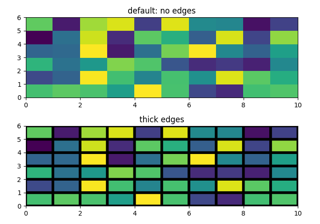matplotlib.axes.Axes.pcolorfast#
- Axes.pcolorfast(*args, alpha=None, norm=None, cmap=None, vmin=None, vmax=None, data=None, **kwargs)[source]#
Create a pseudocolor plot with a non-regular rectangular grid.
Call signature:
ax.pcolorfast([X, Y], C, /, **kwargs)
This method is similar to
pcolorandpcolormesh. It's designed to provide the fastest pcolor-type plotting with the Agg backend. To achieve this, it uses different algorithms internally depending on the complexity of the input grid (regular rectangular, non-regular rectangular or arbitrary quadrilateral).Warning
This method is experimental. Compared to
pcolororpcolormeshit has some limitations:It supports only flat shading (no outlines)
It lacks support for log scaling of the axes.
It does not have a have a pyplot wrapper.
- Parameters:
- Carray-like
The image data. Supported array shapes are:
(M, N): an image with scalar data. Color-mapping is controlled by cmap, norm, vmin, and vmax.
(M, N, 3): an image with RGB values (0-1 float or 0-255 int).
(M, N, 4): an image with RGBA values (0-1 float or 0-255 int), i.e. including transparency.
The first two dimensions (M, N) define the rows and columns of the image.
This parameter can only be passed positionally.
- X, Ytuple or array-like, default:
(0, N),(0, M) X and Y are used to specify the coordinates of the quadrilaterals. There are different ways to do this:
Use tuples
X=(xmin, xmax)andY=(ymin, ymax)to define a uniform rectangular grid.The tuples define the outer edges of the grid. All individual quadrilaterals will be of the same size. This is the fastest version.
Use 1D arrays X, Y to specify a non-uniform rectangular grid.
In this case X and Y have to be monotonic 1D arrays of length N+1 and M+1, specifying the x and y boundaries of the cells.
The speed is intermediate. Note: The grid is checked, and if found to be uniform the fast version is used.
Use 2D arrays X, Y if you need an arbitrary quadrilateral grid (i.e. if the quadrilaterals are not rectangular).
In this case X and Y are 2D arrays with shape (M + 1, N + 1), specifying the x and y coordinates of the corners of the colored quadrilaterals.
This is the most general, but the slowest to render. It may produce faster and more compact output using ps, pdf, and svg backends, however.
These arguments can only be passed positionally.
- cmapstr or
Colormap, default:rcParams["image.cmap"](default:'viridis') The Colormap instance or registered colormap name used to map scalar data to colors.
This parameter is ignored if C is RGB(A).
- normstr or
Normalize, optional The normalization method used to scale scalar data to the [0, 1] range before mapping to colors using cmap. By default, a linear scaling is used, mapping the lowest value to 0 and the highest to 1.
If given, this can be one of the following:
An instance of
Normalizeor one of its subclasses (see Colormap Normalization).A scale name, i.e. one of "linear", "log", "symlog", "logit", etc. For a list of available scales, call
matplotlib.scale.get_scale_names(). In that case, a suitableNormalizesubclass is dynamically generated and instantiated.
This parameter is ignored if C is RGB(A).
- vmin, vmaxfloat, optional
When using scalar data and no explicit norm, vmin and vmax define the data range that the colormap covers. By default, the colormap covers the complete value range of the supplied data. It is an error to use vmin/vmax when a norm instance is given (but using a
strnorm name together with vmin/vmax is acceptable).This parameter is ignored if C is RGB(A).
- alphafloat, default: None
The alpha blending value, between 0 (transparent) and 1 (opaque).
- snapbool, default: False
Whether to snap the mesh to pixel boundaries.
- Returns:
AxesImageorPcolorImageorQuadMeshThe return type depends on the type of grid:
AxesImagefor a regular rectangular grid.PcolorImagefor a non-regular rectangular grid.QuadMeshfor a non-rectangular grid.
- Other Parameters:
- dataindexable object, optional
If given, all parameters also accept a string
s, which is interpreted asdata[s](unless this raises an exception).- **kwargs
Supported additional parameters depend on the type of grid. See return types of image for further description.
